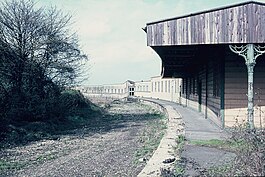Gravesend West railway station
| Gravesend West | |
|---|---|

Station remains in 1969.
|
|
| Location | |
| Place | Gravesend |
| Area | Borough of Gravesham |
| Grid reference | TQ643743 |
| Operations | |
| Pre-grouping | London, Chatham and Dover Railway |
| Post-grouping |
Southern Railway Southern Region of British Railways |
| Platforms | 2 |
| History | |
| 10 May 1886 | Opened as "Gravesend" |
| 1899 | Renamed "Gravesend West Street" |
| 26 September 1949 | Renamed "Gravesend West" |
| 3 August 1953 | Closed to passengers |
| 25 March 1968 | Closed completely |
| Disused railway stations in the United Kingdom | |
| Closed railway stations in Britain A B C D–F G H–J K–L M–O P–R S T–V W–Z |
|
|
|
|
Gravesend West was a railway station on the Gravesend West Line which served Gravesend in Kent. It opened in 1886 and was, for some time, a regular destination for boat trains from London which linked with steamers on the station's pier to ferry passengers to a variety of coastal towns and resorts. The station closed in 1953 to passengers and later to freight in 1968. The only reminder of Gravesend West which remains today is its pier, the rest having been taken over by redevelopment in the area.
Opened in 1886 by the London, Chatham and Dover Railway (LCDR), the station provided the third rail route to Gravesend after the South Eastern Railway's North Kent Line which had reached the town in 1849 and the London, Tilbury and Southend Railway's ferry service from its Tilbury station on the opposite bank of the Thames which had begun in 1854. The official opening of the station to public traffic on Monday 10 May 1886 was marked by the protest of local landowner Lord Darnley who barricaded Stuart Road in protest against the LCDR's right to use his roads in Gravesend. The barriers were removed half-an-hour before the official opening, and the dispute was later resolved by arbitration.
The station had two facing platforms which formed a 'V' shape, with the two left-hand tracks alongside the down platform (No. 1) extending towards the pier. The main station buildings were located at the base of the 'V' and were solidly-built in a slightly Gothic style. It was constructed of yellow under a roof of Welsh slate, with red brick rubbers used for the quoins, arches and bench courses. The buildings extended over the No. 2 up platform which was sheltered by a glazed roof light. An adequately-sized goods yard could be found on the down side, with the goods shed situated on the up side. A steel bridge led out from the station over West Street towards the spartan pier on the muddy banks of the Thames.
...
Wikipedia
